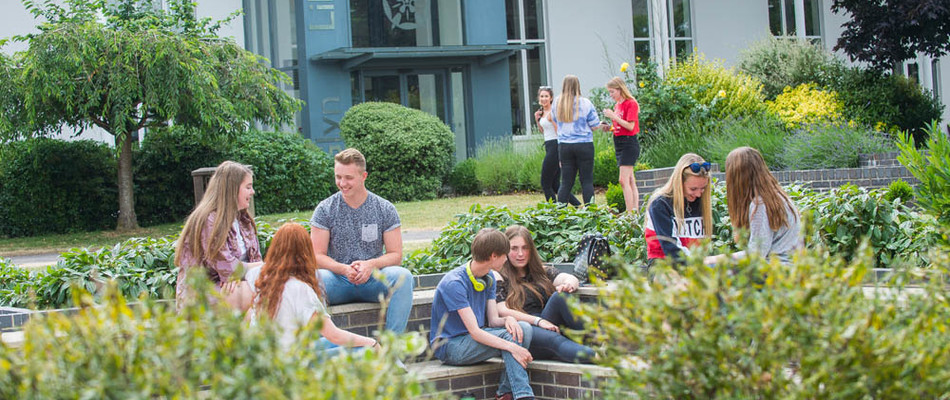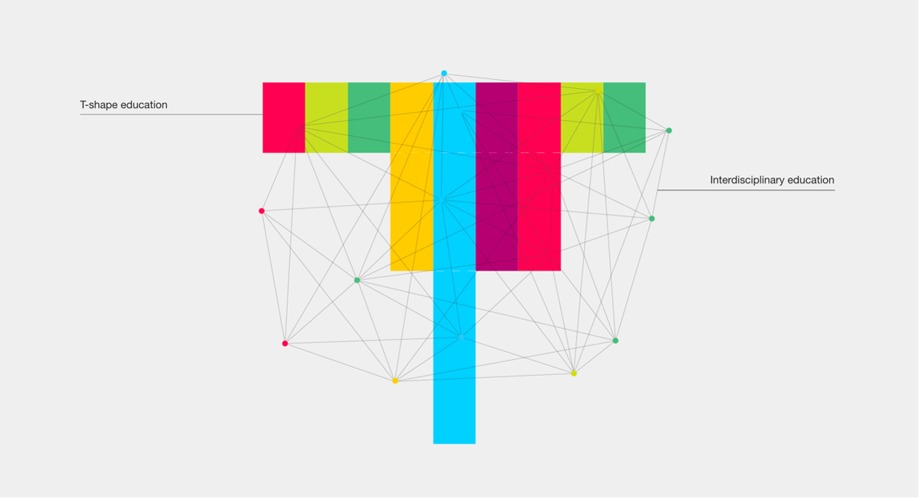Making a case for interdisciplinary learning in the UK
Back
This article is a variation of a blog post previously shared on the London Interdisciplinary School website.
The narrow path of learning in the UK
At school and college, your life is divided up into blocks where, for a short period of time, you focus on a particular subject. 60 minutes on maths, 35 minutes on history. The more of these building blocks you have, the more diverse and colourful your timetable looks.
As you progress through GCSEs, you notice a few of these blocks falling off your schedule. Maybe you don’t get to study Spanish or drama anymore (and maybe this is a relief). Fewer subjects, fewer colours on your planner.
Many students will then go onto study A Levels. More subjects disappear. This time it’s more noticeable — not least because you are now considering subject requirements for particular degree courses you might study. You might need to focus your energy purely on STEM. It doesn’t matter that you like history as well as maths, art as well as computer science, or philosophy as well as physics. You’ve got just three or four big blocks on your planner. And you’re hoping that you really do want to study a chemistry degree after all.
Now you’re an undergraduate. And you can see how your school curriculum was designed for you to gradually narrow down the range of subjects you study, specialising in fewer areas, to become a single subject expert in your post-18 study. So now, at university, there’s only one subject in your planner — maybe two if you’re a joint honours student. And that’s it. For three or four years.
At LIS, we don’t think that this is necessarily a bad thing. The world needs disciplinary specialists like engineers, physicists, doctors and so on. Not to mention that some people simply love a particular subject.
But this doesn’t work for all students. In particular, early specialisation can stop students from exploring different careers — especially those who don’t have much exposure to a range of careers through their family or friends.
And what about talented students who thrive in both history and biology? Who enjoy geography and drama? Is single-subject specialisation really the right path for all students?

(Above: A visual representation of interdisciplinary learning vs. the T-shaped approach in British education, which focuses on specialisation.)
Problems are interdisciplinary, so our curriculums should be too
The world is interconnected, complex, and diverse. A big network of non-linear knowledge — with challenges that don’t map neatly onto discrete disciplines.
Is it possible to tackle a problem as complex as climate change without reference to (at least some of) ecology, economics, geography, and agriculture? We don’t think so. And that’s before you start considering the sociological and psychological knowledge needed to create mindset shifts and inspire real action.
What about the ethics of artificial intelligence? An infamous can of worms that draws on computer science, philosophy, design, and other disciplines besides.
These challenges aren’t the stuff of dystopian or science fiction. They can't be solved by individuals working in isolation, yet most university courses in the UK are still structured in silos, leaving graduates ill equipped to tackle the complexity that surrounds them. These challenges require interdisciplinary thinking, and interdisciplinary solutions.
That’s why we need interdisciplinary learning
At LIS, we’re making the case for problem-based, interdisciplinary degrees. In 2021 we launched our bachelor’s degree in Interdisciplinary Problems and Methods, where students study across different disciplines, making connections, and problem-solving in a deeply interdisciplinary way. Our dot-connecting curriculum aims to cross-pollinate ideas from a wealth of disciplines, to combine and recombine these pieces and find new insights.
Due to the interdisciplinary nature of the course and our innovative approach to admissions, our student body is made up of students who have studied very different subjects at A Level or equivalent. And because the degree covers a range of disciplinary perspectives, students may find themselves immersed in a subject they haven’t studied since their GCSEs.
This is where the problem-centric curriculum offers students the benefit of applying knowledge and skill in context. Learning about economics, chemistry, or history as they relate to social inequality or sustainability can help students master abstract, conceptual content from across disciplines — and facilitate learning in areas that students might previously have thought weren't their strongest.
We know this way of teaching and learning has been a success thanks to U.S. studies of project-based learning, particularly in areas of science and maths. At LIS we take this approach a step further by also teaching quantitative and qualitative methods, where students learn to understand and apply numbers, words, and images as representation systems.
Ultimately, graduates of our undergraduate degree will develop the unique ability to combine insights from very different fields, and apply a range of methods to investigate, quantify, and tackle problems.
Interdisciplinary learning also aims to break down the false dichotomy between academia and the world of work. LIS undergraduates are able to interact with organisations who are working on some of the most pressing and complex problems of our time — whilst studying conceptual and theoretical material from across the disciplines. This porosity with the world of work is built into the curriculum, giving students exposure to a range of professional fields and sectors they might otherwise not encounter until after university.
At the end of their educational journey, the value of what students have learnt shows up in their transferrable skills and wide-reaching academic knowledge, but also in what they can do with their knowledge and skills in a professional environment.
How can we support teachers and colleges?
At LIS, we want to help schools and colleges to find space and opportunities for this interdisciplinary learning. If you’re interested in learning more about how we could support your college’s efforts, do get in touch. We offer in person or virtual enrichment sessions for sixth form students. Find out more here.
The London Interdisciplinary School is a Higher Education provider based in London. They are currently accepting applications for both their bachelor's and master's degrees for the 2022 cohorts.
By Dr Amelia Peterson, Head of Teaching and Learning at LIS, and Kristen Stockdale, Marketing Manager at LIS

